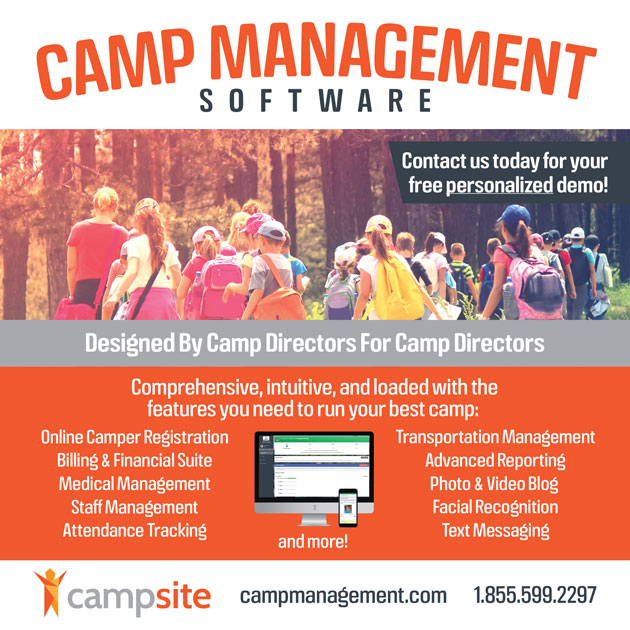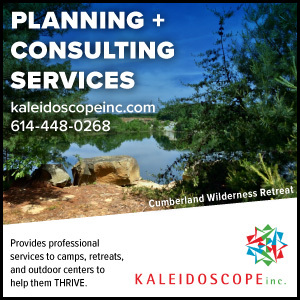Light shed on any situation makes it look different. It follows that the tone we set, both internally and externally, casts shadows and highlights different points of view. As a new supervisor, the most important “lights” to shine allow us to know self (to understand our reaction to circumstances), to be able to separate self-worth from the work produced (because work will not always go smoothly), and to foster self-development in the workplace (by reaching out to role models while not mimicking them). Concerns and challenges about being in a new position are valid, But it is important to remain confident in your own capabilities (they did hire me!).
As new emerging professionals in the industry, the torch is passed to you, and you must step up to shed light on the gifts and areas of growth for camps, as well as yourselves, in the field. The kind of light you choose to shed on yourself will affect how you view yourself. Just as warm, dimly lit campfires seem to inspire healthy reflection and fluorescent lights seem to inspire sharp clarity, we need to learn how to manufacture the clarity of these fluorescents to give us an accurate view of ourselves as supervisors, when considering our identity and value, without losing the comforting amber glow of the campfire.
The light by which we view ourselves as leaders will influence how we view others and can have a drastic effect on those around us. There is a mindset characterized by the sharp brightness of our office fluorescents that, while different for every individual, I believe all leaders experience (yes, even the most accomplished, healthy, and composed) — the “Am I Good Enough? Can I Do This?” mindset. I have heard this mindset echoed through college classrooms filled with anxious students, offices filled with hardworking adults, and gyms filled with playful children. This mindset hides itself well in ambition, hard work, and humility, yet rears its sharp teeth most often to the campers, staff, and leaders who are genuinely pursuing excellence in themselves and others. Let’s recognize this mindset and determine strategies for a successful launch into the realm of supervisor. We want you, the leaders of today and tomorrow, to view yourselves by the brightness and long-lasting light of LEDs as well as the comforting amber glow of a campfire flame.
Stories to Consider as a First-Time Supervisor
As you read, take stock of the feelings, emotions, and actions you would have in the following scenarios:
Consider this: In a moment of vulnerability, a peer shares with you that they are having severe anxiety attacks*. You try your best to comfort and affirm them, but before you can respond with any sage wisdom, your peer interrupts. “But I know why this is happening,” they almost shout with tears in their eyes. They describe to you, with flawless self-awareness, the thoughts, emotions, actions, and circumstances that they have allowed to slowly diminish their view of themselves. Then they shamefully put their hands in their pockets and say, “But I don’t know, I should be better than this.” I know the lessons learned as a peer leader serve as a steppingstone to where I am now.
Consider this: You are running an event on your own for the first time. After a quick description of what your responsibilities will be, you stop your supervisor and blurt, “Are you sure I am ready for this?” And you wonder if that question invalidates your potential success. In return your supervisor asks if you are nervous. And though you are wildly aware that you are, in fact, very nervous and more confident in your inevitable embarrassment than your ability to succeed, you don’t feel free to say so. Instead you say, “I’m ready.”
Start with the “Self”’
If you are supervising or mentoring anyone this summer, I encourage you to do the following:
- Step away from any group settings or environments of responsibility and take these steps:
- Close your eyes, take a deep breath, and count to 60, being diligent to not try to clear your mind or get control of your thoughts, emotions, or your body’s actions. Just experience what you are experiencing.
- Open your eyes and recognize your ability to be independent of your thoughts, emotions, and actions when you do not try to control them.
- Do both steps at least two more times before you finish reading this article, because this is a simple exercise in establishing your “self.” The pause helps you be more aware of your thoughts, emotions, and actions so you can establish your own identity (not be a copy of someone else) and make the distinction between looking up to someone and trying to become someone. Better knowing self brings about conviction to make tough decisions (and you will have them).
As a supervisor, you will be thrown curve balls multiple times during the day. How you choose to respond will set the tone for your problem-solving process and how the person you are working with perceives your level of belief and support for them.
It Is All about the Choices
A goal for any supervisor, especially a new one, is to be open to multiple options rather than thinking only one solution exists. We want to build on our own healthy self-reflection to see our thoughts, emotions, and actions independently of a situation and to understand our own reactions, so we can place them in context with our organization and see options.
1. Issue of Control
When we lose control of our thoughts, emotions, or actions, we sometimes revert to subconscious defense mechanisms or conscious coping mechanisms that help us regain control but may not help us establish a healthy manifestation of who we are. Too often, strong critical thinkers, ambitious dreamers, dedicated hard workers, and humble servant leaders are unable to separate “self” from their ideas, job performances, roles, and responsibilities. We can be too hard on ourselves as we push to grow and improve. We cannot control situations and want to be open to alternative resolutions.
2. A Level of Separation
We must meet our own job responsibilities. However, there is a difference between investing in the job and allowing identity, value, and self to become the power trip. When we can be vulnerable (about what we know and don’t), self-reflective (about strengths and growing edges), and humble (about wanting to learn and share) without compromising the value of our identity and personality, we can begin to learn that balancing act.
3. Proactive Skill Acquisition
Expand your toolbox. Healthy introspection is an important way to build your skills as an effective leader. Whether or not you have been trained in active listening, conflict resolution, and other important interpersonal tools, at the core it is being able to convey your thoughts, emotions, and actions without attaching your identity to them. Knowing that feedback, openness to new ideas, and truly hearing others is key to seeing areas to build skills. Ask to sit in on a few conversations (they might say “no,” but you won’t know unless you ask), ask for feedback on a conversation you just had (from the peer or from your supervisor), and really reflect on the feedback offered. Look for role models and actively participate in conversations.
Your role as a new (or newer) supervisor is a gold mine to be explored and cultivated. You have the opportunity to grow and reflect as you support your staff in a parallel process.
For many, at the end of our programs, we gather around the amber glow of a campfire. We invite all to take a moment, and we ask that you do now. Reflect on which light you view yourself in. What situations have been and will be overwhelming for you as a supervisor of children this summer? How could your life and the lives of those around you be impacted by viewing yourself in a different light? At the end of the day, this is the same dream we pass onto our campers: that the amber campfire glow, which inspires vulnerability and unity, will not be just a summer experience, but rather a mindset to take home, to school, and through the rest of their lives. We hope you will continue to pursue this dream of positive emotional and mental health for yourself with the same passion and dedication that you pursue it for your campers.
* Note from the authors: As you uncover mental health challenges within yourself or others, let someone know and partner with a mental health professional. Only you can take the first step, but others can help you find a path.
SOCKS
Because leaders are often driven to be catalysts for change, we are challenged to validate our “self” if we do not see what we had in mind come to fruition. In Spanish, “Eso sí que es” (phonetically in English SOCKS) means “It is what it is.” This is a phrase we can use every day when we do not see things go the way we envisioned them, despite giving our best effort. When we internalize this phrase as a mindset, it becomes more than a reaction to negative circumstances. “It is what it is” becomes a reminder for us that our expectations may not match our present reality, even when we have given our best effort — and that is OK.
Discussion Questions
- How often do you take stock of your thoughts, emotions, and actions? If you find that you are only aware of your thoughts, emotions, and actions as reactions to your circumstances, what might you do to change that?
- Are you in control of your thoughts, emotions, and actions, or are they in control of you? Explain.
- Are you aware of what motivates you, or are you unable to honestly process why you do certain things? Explain.
William C. Logan, III, graduated with a BS from Clemson University’s Parks, Recreation, and Tourism Management program where he helped build an ongoing peer mentorship initiative. He will be excitedly navigating his first summer as a full-time camp professional as you are reading this article.
Gwynn M. Powell, PhD, is on the faculty in Park, Recreation, and Tourism Management at Clemson University and has two decades of camp experience in the USA, Russia, South Africa, and Turkey. She also volunteers with the International Camping Fellowship.
Mary Katherine King is a junior at Clemson University. She is pursuing a Parks, Recreation, and Tourism Management degree, with the aspiration to establish a career in the camp industry upon graduation. This summer will be her transition into a supervisor role at camp.





